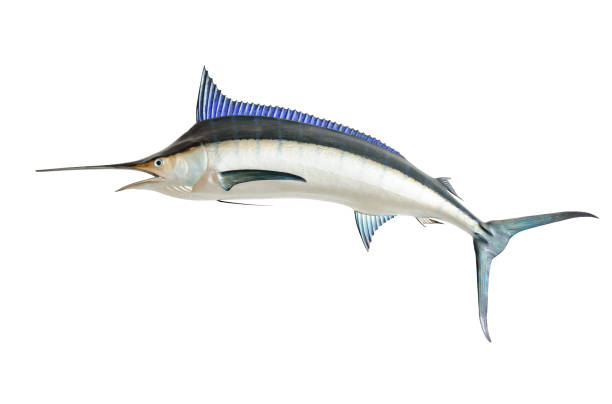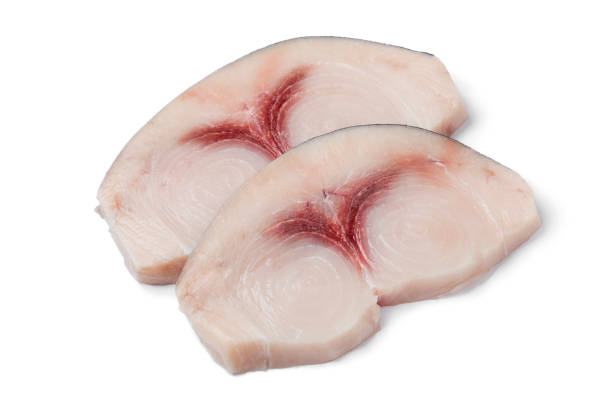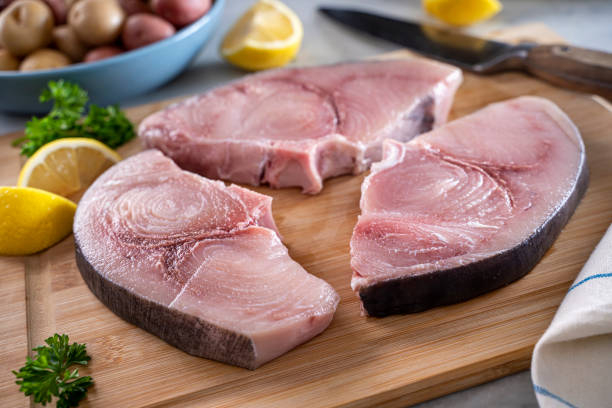Top 5 Health Benefits of Swordfish
Many people devour swordfish, a big predatory fish, all around the world. Its name derives from the bill, which is its distinguishing feature, which resembles ... read more...a sword. It is also among the ocean's quickest fish that is currently known. Swordfish has a unique nutritional profile and many benefits for good health. However, ingesting it excessively or repeatedly might cause mercury poisoning. This article reviews the health effects of eating swordfish.
-
Swordfish are rich in multiple essential nutrients. Essential nutrients are ones your body cannot produce, so you need to get them from food. A 3-ounce (85-gram) serving of cooked swordfish provides:
- Calories: 146
- Protein: 20 grams
- Fat: 6.7 grams
- Carbs: 0 grams
- Selenium: 106% of the Daily Value (DV)
- Vitamin D: 71% of the DV
- Potassium: 9% of the DV
- Magnesium: 7% of the DV
Selenium levels in swordfish are very high. Due to its part in immunity, heart health, thyroid and bone metabolism, male fertility, and other processes, this vital trace mineral is crucial for human health. Additionally, it's a fantastic source of vitamin D, which is essential for bone health and is also good for immunity, heart health, and asthma. A fatty fish with high levels of the omega-3 fatty acids eicosapentaenoic acid (EPA) and docosahexaenoic acid (DHA), swordfish is another source of these nutrients. Aside from being necessary, EPA and DHA are also well-known for preventing heart and inflammatory illnesses as well as helping to enhance brain function.

High in nutrients 
High in nutrients -
Cholesterol levels and high blood pressure both increase the chance of developing heart disease. Swordfish contains omega-3 fatty acids, which may have a favorable impact on cholesterol and blood pressure, particularly in those who already have a cardiac problem. They don't seem to affect prescription medications. According to research, EPA and DHA may reduce blood pressure by lowering heart rate and enhancing the flexibility and function of blood vessels. Additionally, they may reduce your blood triglycerides by 20 to 30 percent and aid in preventing blood clots from developing and obstructing your arteries.
However, they might raise levels of LDL (bad), a risk factor for heart disease. Swordfish contains vitamin D, which may also help to decrease blood pressure and heart attack risk. In fact, research indicated that those who did not get enough vitamin D had a 60% increased chance of developing heart disease. Taking vitamin D supplements may reduce systolic blood pressure, which is the highest number on a blood pressure reading, by 2 to 6 mm Hg, according to evidence. It could achieve this through interacting with a number of bodily systems, such as your kidneys and endocrine system.

May lower risk factors for heart disease 
May lower risk factors for heart disease -
The presence of selenium, vitamin D, and omega-3 fatty acids in swordfish, may help prevent cancer. Omega-3 fatty acids and vitamin D have anti-inflammatory qualities, and inflammation is a risk factor for developing cancer. Both minerals may aid in preventing colorectal cancer, according to studies. Both nutrients have the potential to kill malignant cells and stop them from proliferating. Additionally, vitamin D could aid in inhibiting the development of fresh blood vessels that supply those cells. The metastasis, or cancer's process of spreading, is another thing that omega-3s aid to stop. Research on both animals and people suggests that they could shrink the growth of colorectal tumors. Human research, however, produces mixed findings.
Selenium, on the other hand, functions as a potent antioxidant that counteracts the cancer-causing effects of too many free radicals in the body. It could offer protection from lung, liver, breast, and prostate cancers. People receiving radiation may also benefit from using selenium supplements to enhance their quality of life and lessen the negative effects of the treatment. Despite the fact that this study's findings are encouraging, it's vital to keep in mind that it only examines the benefits of certain nutrients, not those of eating swordfish in general. Therefore, greater study on the impacts of swordfish especially is needed.

May reduce the risk of cancer 
May reduce the risk of cancer -
Swordfish's selenium and vitamin D content may help bones stay healthy. Your body uses vitamin D primarily to promote calcium absorption in the intestines. A lack of it is associated with bone loss, and an increased risk of falls and fractures, and it also plays a crucial role in bone development. Despite being less well-known than vitamin D, selenium contributes to bone health by affecting bone metabolism. Osteoblasts and osteoclasts, two types of bone cells, control this process.
Osteoblasts create bone tissue, while osteoclasts demolish it to release minerals into your circulation in a process known as bone remodeling. By deactivating osteoclasts to avoid brittle bones, selenium contributes to the maintenance of equilibrium. Low levels of selenium in the blood have been linked to a higher risk of low bone mineral density and bone disease, according to studies.

May boost bone health 
May boost bone health -
Swordfish contains vitamin D, which may improve mental and cognitive abilities. The brain's growth and operation are aided by vitamin D. For optimal mental function and cell survival, blood, and brain selenium (found in swordfish as selenoproteins) levels must be balanced. DHA is essential for increased brain function and cognition. Important antioxidants like EPA and DHA shield the eyes against inflammatory eye conditions including dry eye disease (DED) and macular degeneration (AMD). These beneficial fats lower inflammation and protect your eyesight.
An excellent source of protein is swordfish. Swordfish has enough of the necessary amino acids to support a healthy metabolism, according to nutritionists. About 20 grams of proteins may be found in one serving of swordfish, and proteins are essential for the upkeep of healthy tissues including skin, hair, and muscles. Proteins are used by the body to make enzymes and carry oxygen. Magnesium assists your muscles in contracting. Additionally, one meal contains about 10% of your daily necessary potassium intake. In order to maintain a healthy water balance in your body, potassium, a mineral, works in conjunction with the salt you ingest. High blood pressure might result from having more sodium than potassium in your body.

Help physical health 
Help physical health


























